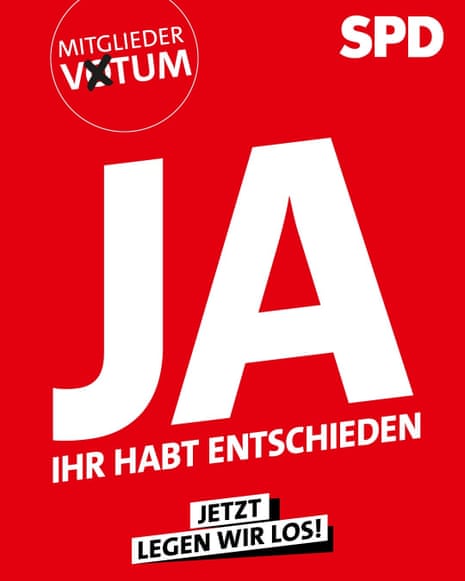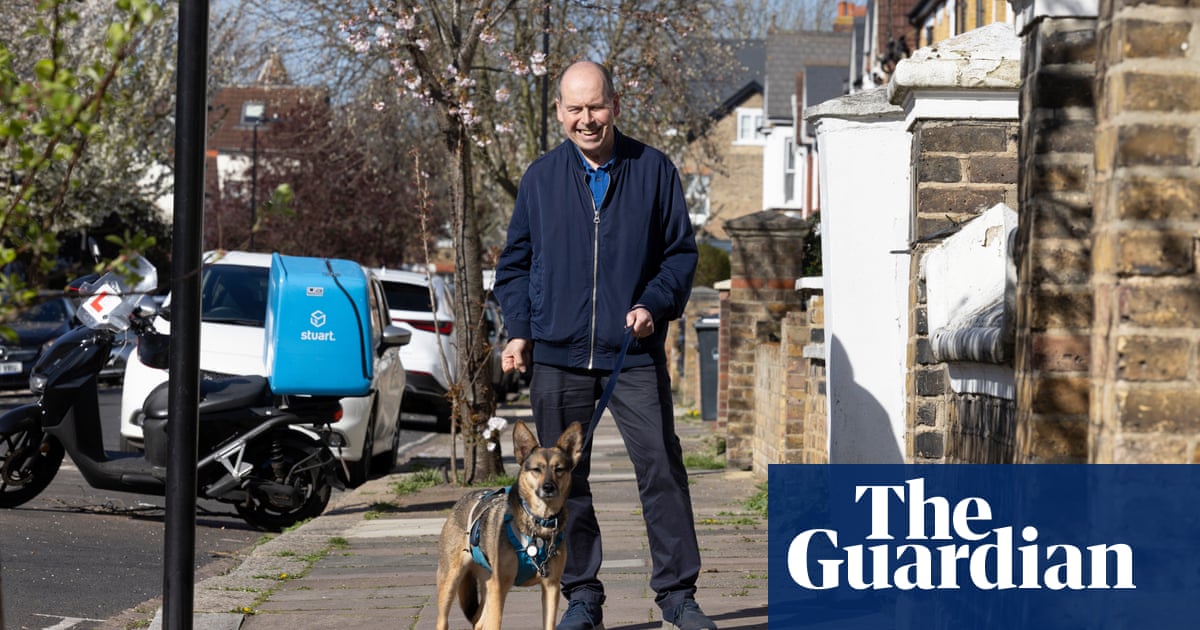Social Democrats approve German coalition deal
And it’s now done: SPD members have approved the coalition deal with the overwhelming “yes” from 84.6% of those who cast their votes.
15.4% voted against, with 56% turnout, SPD said in a social media update.

In a separate emailed update, SPD’s secretary general Matthias Miersch said “in these very difficult times in global politics, we bear responsibility for our security, for economic growth, secure jobs and equal opportunities,” Reuters reported.
The approval paves the way for Friedrich Merz to be confirmed as the next German chancellor next week.
Key events Show key events only Please turn on JavaScript to use this feature
Focus shifts to first 100 days of Merz's government - snap analysis
Marion Muehlberger, economist and political analyst at Deutsche Bank Research:
“SPD members have approved the coalition agreement, as hoped, and cleared the way for the election of the next German chancellor on 6 May.
Markets will now be focused on the new government’s 100-day programme, which is expected to be announced next week.
How quickly the new government draws up the budget (and whether it will be passed before the summer break) will be decisive for whether economic policy impulses contained in the 100-day programme can still take effect over the summer.”
Social Democrats approve German coalition deal
And it’s now done: SPD members have approved the coalition deal with the overwhelming “yes” from 84.6% of those who cast their votes.
15.4% voted against, with 56% turnout, SPD said in a social media update.

In a separate emailed update, SPD’s secretary general Matthias Miersch said “in these very difficult times in global politics, we bear responsibility for our security, for economic growth, secure jobs and equal opportunities,” Reuters reported.
The approval paves the way for Friedrich Merz to be confirmed as the next German chancellor next week.
Multiple people questioned as part of Uppsala investigation
Speaking at a press conference, chief of Uppsala police, Erik Åkerlund, said that multiple people were questioned as part of the “fast-paced” investigation over night, with one arrest made.
He also confirmed that the attack took place in a hair salon.
Åkerlund said the shooting appeared to be an isolated incident and was deemed to not be an active threat as Swedes prepare for the Walpurgis night celebrations tonight.
Swedish police arrest Uppsala shooting suspect
Elsewhere, Swedish police said they have apprehended a suspect after a shooting in which three people were killed in the city of Uppsala on Tuesday, Reuters reported.

A large area was cordoned off in the centre of Uppsala, a university city 45 miles north of Stockholm, after witnesses described hearing multiple shots at about 5pm local time and seeing people running in different directions and hiding.
A masked person was seen fleeing the crime scene on an electric scooter.
Morning opening: Is this a Ja, SPD?

Jakub Krupa
Germany could see its next government all but confirmed today, as the Social Democrats (SPD) are set to confirm how its 358,000 members voted on the coalition agreement with the conservative CDU/CSU.

The vote closed just before midnight, and the announcement is expected around 10.30am Berlin time.
If the deal is approved, it will be formally signed on Monday, paving the way for Friedrich Merz to be elected chancellor the next day.
Speaking at the summit of centre-right European People’s Party congress in Valencia yesterday, Merz appeared very confident about the outcome of the vote as he promised “more German leadership than we have seen in the last years.”
In a wide-ranging speech, he promised to “invest a lot of energy into moving Europe forward,” saying that “the challenges we are faced with, surpass our ability to deal with them alone on a national level.”
“This … is … the hour of Europe, or more precisely, the European Union,” he declared.

Outlining his plans for Germany and Europe, Merz pledged to “stand even more strongly” for values of sovereignty, freedom and democracy by supporting Ukraine, and warned about Donald Trump’s policies “putting our transatlantic alliance to a test” by “threatening to plunge the world into a new age of protectionism.”
Merz publicly backed the current European Commission, but also vowed to “pledge regulation on all levels,” pointing to fixed bottle caps and new safety rules for cars as irritants for many Europeans.
“Do we really [want to] make the EU more unpopular with such kinds of regulation? … Let’s not destroy popular [support] for our great European Union and our great European project with such nonsense,” he said.
I will bring you all the latest throughout the day on the outcome of the SPD vote, but also with more updates from Spain and Portugal as they reel off the blackout on Monday, from Greenland where the Danish king continues his formal visit amid Trump’s interest, and across the continent.
It’s Wednesday, 30 April 2025, it’s Jakub Krupa here, and this is Europe Live.
Good morning.

 5 hours ago
4
5 hours ago
4













































